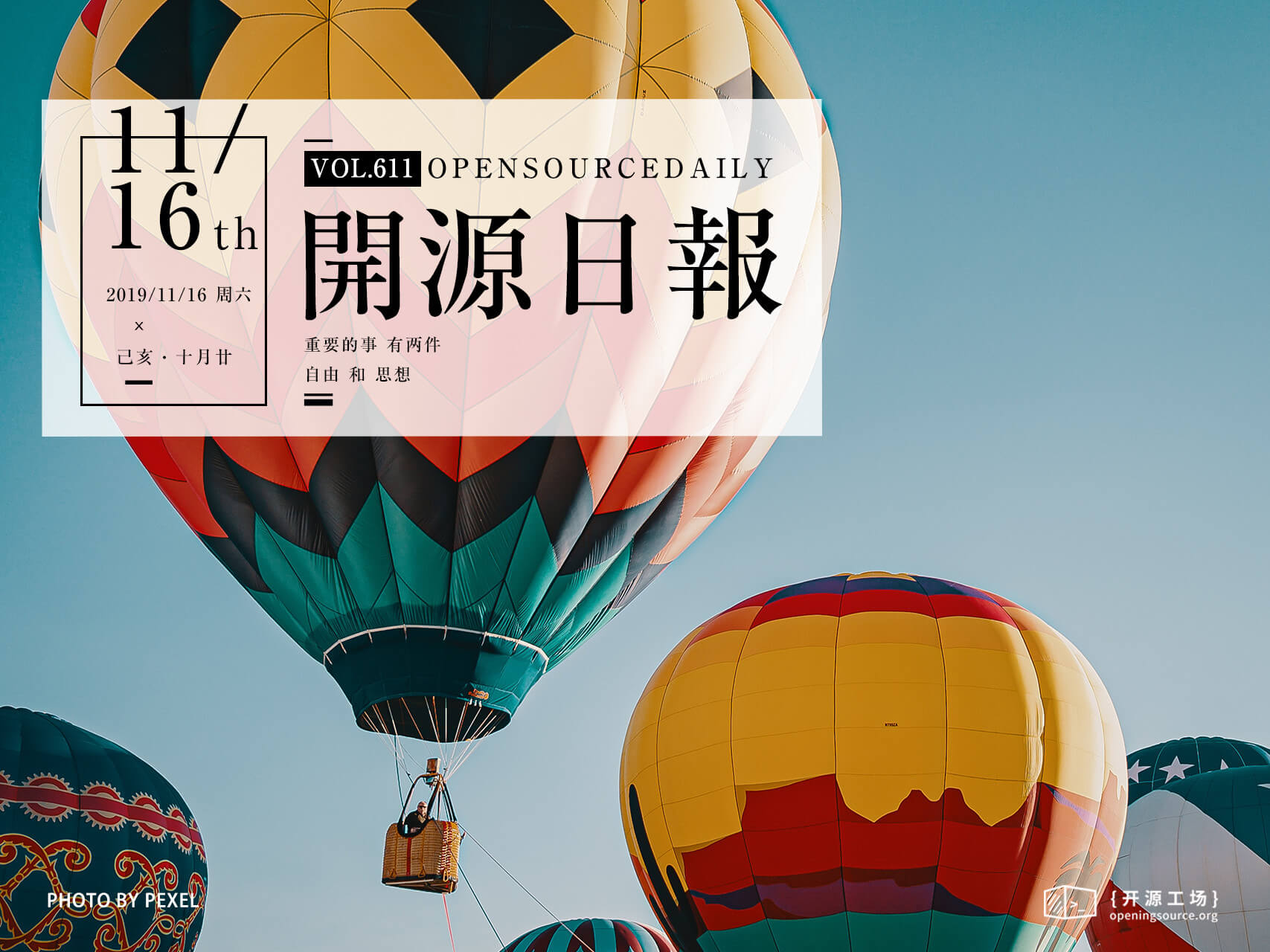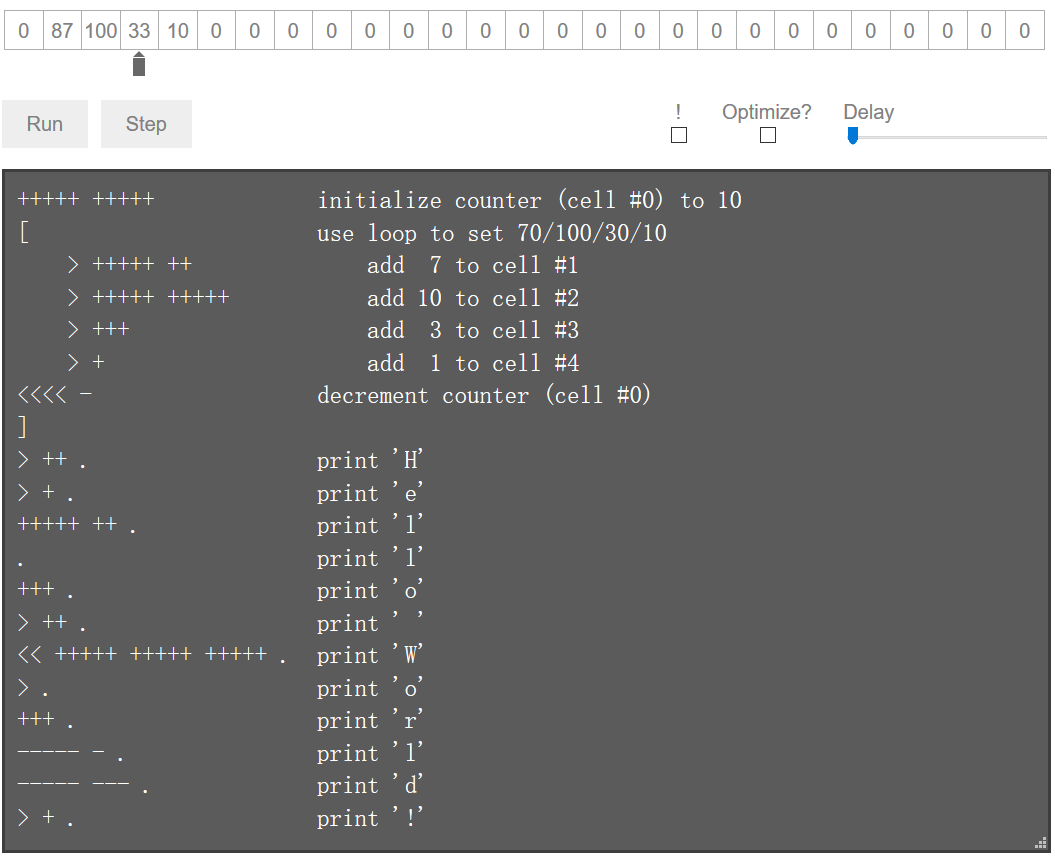今日推薦開源項目:《傳說的最小 brainfuck-visualizer》
今日推薦英文原文:《How to master your creativity》

今日推薦開源項目:《傳說的最小 brainfuck-visualizer》傳送門:GitHub鏈接
推薦理由:Brainfuck,傳說中最小的編程語言,只一機,一指針,八命令而已。這個名字大概是因為它的代碼真的很難讀懂吧……這個項目使用 JS 將這個傳說中的編程語言進行解釋並可視化執行過程,有了清晰明了的執行過程之後反而很容易理解它的操作原理,那些看似不明所以的命令僅僅只是對數據塊進行操作和輸出而已。

今日推薦英文原文:《How to master your creativity》作者:Laura Sima-Sirban
原文鏈接:https://medium.com/@simasirban.laura/how-to-master-your-creativity-30fc04ca7c68
推薦理由:尋找更多的創造性,特別是在需要想法的時候
How to master your creativity
What can you do to be creative?This question popped up in my mind when I was in university, trying to figure out what makes a good designer. Back then, I thought that creativity and being more creative is the answer to that question.
While I』m yet to figure out what makes a good designer, I learned two big things about creativity.
First — creativity is super important. In a world where the future is pretty uncertain and where we need to reinvent ourselves a few times, professionally or personally, creativity is key.
Second — creativity is not restricted to artistic professions. Whether you』re a programmer, data analyst, doctor, scientist, architect or what have you, creativity can definitely help you be a better professional.
The problem is that we never learn how to be creative. We spend our time in school with standard subjects like mathematics, literature, physics, history or geography, etc. But we don』t have a subject to help us tap into or to develop our creativity.
Back when I got started, creativity seemed like this magical, mystical thing. It depended mostly on random flights of inspiration. If those are not there, well, then good luck.
In reality, creativity is hard work and a specific mindset. The more you practice, the better you get at it.
Along the way, I also discovered a few ideas that can help you master your creativity.
Lose the fear
If you』re wondering why this is first, consider this: How can you do good creative work when you』re dedicating mental space to negative scenarios? How can you come up with something truly original if you』re scared of it?Creativity requires focus and dedication. If you really want to create something innovative and original, you need to put in the effort. Building up doomsday scenarios and doubting yourself makes the job a lot more complicated.
We』re all scared of something when it comes to the work we put out there. For me, it was the fear of being wrong for a long time. Because of that, I』d go with slightly obvious ideas, which were pretty unremarkable, to put it mildly.
Fear is not a catalyst for creative work. It undermines your self-confidence, as you continuously wonder if you』re good enough. It also keeps you from trying things that might actually be good because… what if?
But if you』re really out to create something original, you』re bound to stumble into a few blunders along the way.
The thing is you only have control over how you react to things. Instead of making up doomsday scenarios, think of what you can learn from things that didn』t go so well. Think of what you can do to bring your ideas to life. This way, it』s easier to stay focused and avoid spiraling.
Keep an open mind and don』t judge yourself. You might be surprised by what you can accomplish if you lose fear and…
Embrace experiments
One of my favorite books on creativity is 「Creativity, Inc 「 by Ed Catmull. Drawing on his experience at Pixar, Ed Catmull gives some insight into their creative process. When Pixar starts working on a new movie, they always start with a broad idea of what they want to accomplish. From there on, they just try out things to see which ones work. They never know what the story will look like until it』s finished.A good part of mastering creativity is about embracing experiments. Combine, learn, connect different things — things that might not seem that closely related at first. Even if it seems dumb in the beginning, go with it for a while, see where that takes you.
To start, you just need an idea of what you want to accomplish. How you get there and what happens along the way, that』s up to you to discover. And you don』t know what cool new things you find along the way.
Experiments are a good way of trying out different things until you find the one that』s best.
Don』t hold on (too tight) to definitions
Probably you』re familiar with this: 「I don』t know/want/shouldn』t know how to do this or that, I』m just a (insert your job title)」. For example: 「I don』t know how to paint, I』m a doctor.」 Or 「I don』t know how to write, I』m a programmer」Well, newsflash: you』re not your job title. Even if you hold a specific position, that doesn』t define what you can and cannot do. That』s up to you to decide.
It might be harder in the beginning because we tend to identify a lot through our careers and our jobs. Yet, we shouldn』t use those as excuses or as definitions of who we are and what we』re capable of.
This is one of the best things I learned from a previous job. We didn』t have job descriptions, we had responsibilities. That meant I got to work in various areas, learning new skills along the way. The best part about this that, after a while, I got to see how different dots connect, along with the whole picture.
We often celebrate it when people look outside of their boxes for new solutions and for new ideas. What about if we stopped building boxes for ourselves altogether?
Keep working
Persistence is key when it comes to mastering creativity. In a world that』s louder and louder, it becomes harder to cut through the noise. Also, it takes time until you build up your own voice, your own style, and your own ideas.Ira Glass puts this better than anyone ever could: 「All of us who do creative work, we get into it because we have good taste. But there is this gap. For the first couple of years, you make stuff, it』s just not that good. It』s trying to be good, it has potential, but it』s not. But your taste, the thing that got you into the game, is still killer. And your taste is why your work disappoints you. (…) Most people I know who do interesting, creative work went through years of this. We know our work doesn』t have this special thing that we want it to have. We all go through this. (…) you gotta know its normal and the most important thing you can do is do a lot of work. 「 (source:https://www.goodreads.com/author/quotes/113989.Ira_Glass)
Even if you』re no longer a beginner, if you』re a creative type, you never feel like you』re done. There』s always something to experiment with, something new to try. Truly creative people keep busy — this is a characteristic Mihaly Csikszentmihaly outlined in his book 「 Creativity: Creativity: Flow and the Psychology of Discovery and Invention」(https://www.goodreads.com/author/quotes/113989.Ira_Glass)
Be ruthless with your own ideas
For creative people, our ideas are our babies. We love them because they reflect some part of us. Through our ideas, we share something of ourselves and how we see the world.But that』s where it gets tricky. When you』re too much into something, it』s hard to evaluate it. It』s hard to tell if an idea is good or bad if we』re too much in love with it, just because it』s your idea.
Mastering creativity is also about deciding whether an idea is actually good.
In order to do that, you need to learn to detach yourself from it. Take a step back and scrap everything on your mind about it. Try to see it through the eyes of someone who doesn』t have anything to do with it. Would you still say it』s a good idea? Would you say it』s a bad one? What arguments do you have for each of these scenarios?
Make educated guesses
Whether we admit it or not, we would like to be right. The first time, if possible.It goes way back to when we were in school. Here, questions usually have one right answer. Also, if we study hard enough, we know what that is.
With creative work, there isn』t one single right answer. For any given problem, there can be multiple solutions that work equally well.
No matter how many tools we push or how many skills we develop, we』ll never have that one, correct answer. At best, we are making guesses. It』s up to us to educate those guesses.
How do you do that? One』s research. Do your homework, find out as much as you can about your problem or situation you』re working with. The second one is getting as familiar with the process and mastering the basics.
For those with some experience, educated guesses sometimes come in the form of intuition or a small voice at the back of your head nudging you in one direction. Don』t ignore those. Learn to work with them — ask yourself why it』s suggesting one thing or the other.
Learn to sell your ideas
Creativity sometimes has this romantic allure that good ideas will prevail. If it』s a good one, it rises to the surface in the end, right?The reality is a bit different.
Ideas that don』t spread die. It can be a good or a bad one, but it won』t survive for long when only one person believes in it. Additionally, bad ideas sometimes spread, leaving everyone wondering what』s happening.
Mastering creativity is also about selling your ideas. It』s about making sure that they spread and turn into reality.
Whether you work alone or in a team, you need to get buy-in from others to actually make things happen. You need to get people to support your ideas. Maybe sell is not the best word here, but to make sure your ideas catch on, you need to win others on your side.
If you don』t get others to believe in what you do and how you see things, other people will. And we』re all familiar with bad ideas that gain momentum.
下載開源日報APP:https://openingsource.org/2579/
加入我們:https://openingsource.org/about/join/
關注我們:https://openingsource.org/about/love/
